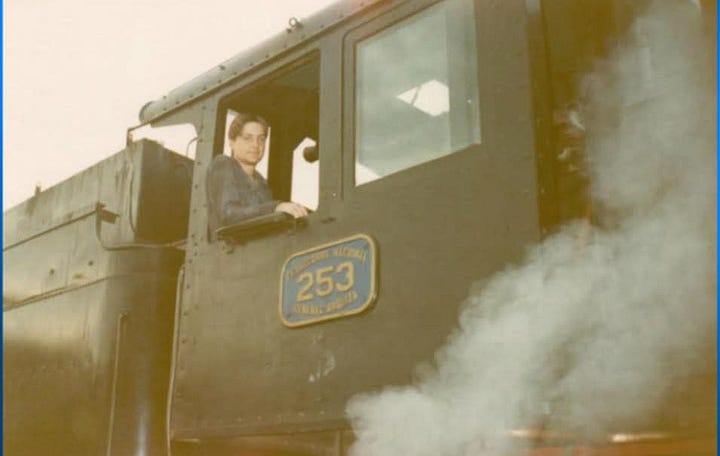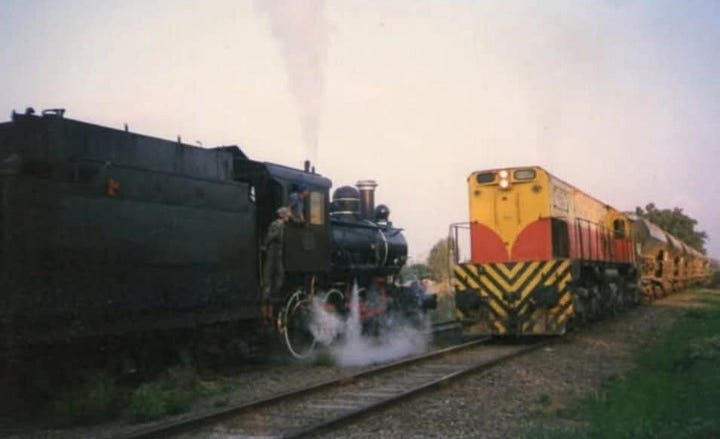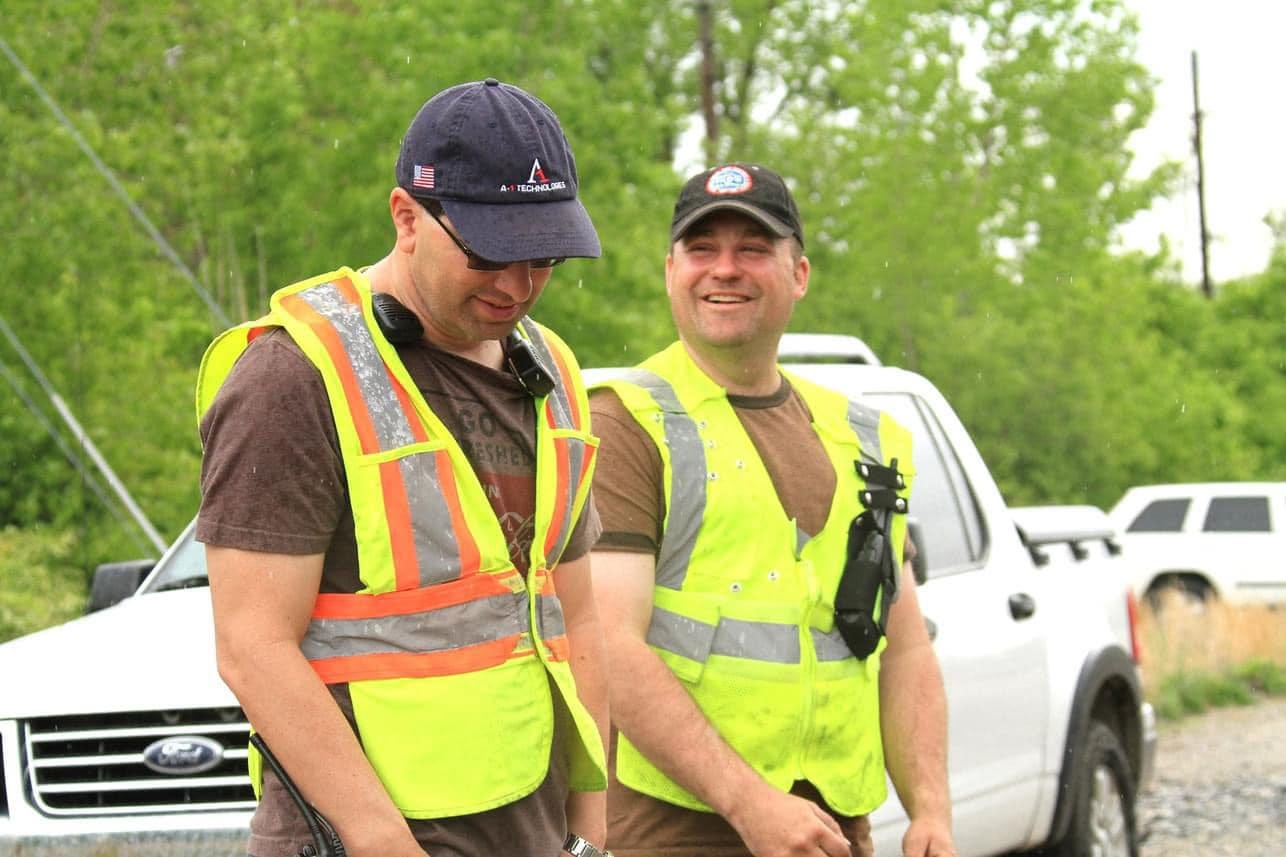Brett Goertemoellor - Pride in Industry
Behind the Throttle: Edition 2, Installment 6
“Railroading is not a career path, it’s a lifestyle”.
The world of railroading is not confined to just what happens above the right-of-way, rather the railroads often influence communities and lifestyles well beyond where the tracks end. Our spotlight today, specially picked to be featured on Memorial Day, shares insights on how one prideful and storied industry interacts with another. Today, we feature Brett Goertemoellor, Pride in Industry.
Brett grew up in the small central town of Oneonta, New York, not far from the mainline of the Delaware and Hudson Railroad. From the porch of his childhood home, he could hear long freight trains with tired first-generation diesels at the helm, and was quickly taken to watch the trains thunder by. He remembers he would flash the light on his porch on and off as a way to say hello to the crews, and also bonding his with his next-door neighbor, a World War II veteran and retired D&H engineer that ran trains on that very line in the steam era. His parents, especially his mother, were not so fond of the fascination as they viewed trains a “dirty and dangerous” way to make a living, but the allure stuck with Brett all through his childhood. His interest continued to grow as he spent many afternoons trackside, trying to make sense of the massive machines and endless strings of freight cars, and the history he began to uncover further brought him into the world of trains. Around the start of high school, Brett began to volunteer with the local chapter of the National Railway Historical Society (NRHS) and found himself curating collections, stories, and history from railroads all around the region he called his home. By this point, he knew trains were going to be around for a long while, and his parents eventually came around.


Beyond high school, Brett began on a streak of traveling far and wide, putting his boots on the ground for various operations. On a rotary exchange program, he spent nine months in Argentina, working with the Ferroclub Argentino (essentially their equal of the NRHS). Here, he, traveled across the country and working with historic trains of all shapes and sizes. Those nine months were Brett’s first instance of being paid to work on trains, and he fell in love with the railroad mentality that sustain him through his travels - after having seen pretty much all of Argentina from the footplate of various locomotives, how could he not? Upon his return to the United States, Brett began to seek out railroad opportunity wherever he’d wind up. He moved up to New Hampshire to began his collegian studies and worked at both the now-defunct Plymouth and Lincoln Railroad and the Cog Railway in Mount Washington - where’d he’d spend most of his summers working in-between terms. After his graduation from university, Brett travelled to the far-opposite side of the United States to attend the Modoc Railroad Academy, an institution that offers comprehensive courses detailing elements of railroad safety, logistics, management, and operation. With a surplus of education and experience, Brett came back to the east coast and was eager now to get started with a railroad career in a common-carrier role. He hired on with the Panam, a shortline freight railroad in the northeast, and worked behind the throttle as an engineer before moving to the New England Coast Railroad in the same role. He spend a few years with these railroads before finding a new opportunity that was more akin to his nomadic lifestyle that he enjoyed.
The Ringling Brothers and Barnum & Bailey Circus is a household name in traveling entertainment and once upon a time based their shows out of a train that would bring the circus to it’s next stop. In 2013, Brett was offered the opportunity to work for the circus as their trainmaster, responsible for coordinating moves of the near mile-long train that would bring all of the pieces of the circus - rigs, performers, vehicles, elephants, and clowns - from town to town. Brett greatly enjoyed the responsibility of this role, and took pride in helping bring entertainment all across the world by means of rail transport. Brett also coordinated the logistics for loading and unloading the train, maintaining the expansive fleet of railcars, and hosting relationships with the railroads that would be moving the train. The coveted job was held by a relatively small group throughout the circus’s multi-century tenure above steel rails, and Brett feels honored to have been one of the last trainmasters before the circus did away with the train in 2017. The community that formed on their trains brought the whole cast of the circus together and collided the unique world of railroading and sideshow.
Past his time in the circus, Brett dipped back into the world of tourist and historic trains, working briefly for the Iowa Pacific Railroad and also doing some independent contract work on small-scale steam engines. Though his next big opportunity would once again put him on the road and in charge of a few dozen railroads (3 to be exact). In 2022, Brett began working as a DOD Civilian with the United States Military as a Designated Supervisor of Locomotives Engineers (DSLE) and Senior Railroad Instructor, overseeing the 36 railroad sites at military bases around the country. Brett trains and performs compliance testing and recertification for all of the operating crews at the various sites, along with building the programs to certify engineers and conductors as per the Federal Railroad Administration standards outlined in the Code of Federal Regulation, parts 240 and 242. Brett feels that it’s rather rewarding to work in the military railroad realm, saying it’s “an honor to have a job like this”, but also recognizes the huge responsibly he has to make sure sensitive shipments are handled safely and professionally. “The things we haul go boom”, he added with a laugh. Brett’s teachings within the railroads of the military dictate that being a soldier and a railroader mean more than just your profession: “Railroading is not a career path, it’s a lifestyle”. The on-call expectation, along with the expectations of quality work that vary day-to-day, are principles that make up the idea of railroader on every level, and he feels that soldiers have a good respect for this mentality. He feels that railroad mentality is similar to military mentality and though his soldiers complain just the same as an old-head railroader might, they always get the job done. Brett works to ensure there is a large degree of consistency across his training programs, such that his crews all run trains the same way and could perform their duties in a similar fashion at any railroad base (or an outside railroad). He enforces idea of common-sense practices, noting that in most cases, railroads have rules for things that just make sense: “the rule book is written in a way where you shouldn’t have to have a rule about it”. The work Brett does takes him all over the country and he enjoyed the travels and flexibility with his job, and also appreciates that he gets to see the moving parts in our defense system on so many levels. Further, he is grateful to interact with the select group of railroad soldiers that ensure a vital piece of transportation that keeps our military in motion.
Fascinated with both military and railroad history, it’s no wonder why Brett’s current job excites him. Going further into this specific realm of railroading, Brett and a handful of other dedicated folks have headed up the Military Railroad Society, and organization that aims to tell the stories of railroads and railroaders in wartime from the Civil War onwards. Through artifacts, stories, exhibits, and events, the Military Railroad Society pursues the idea that railroads are a value tool that serve communities in a variety of times of need. They also prioritize the idea that railroads in the military are a prideful and celebrated craft, just like railroading on a commercial sense. The railroad lifestyle includes lots of camaraderie and attention to the job with a drive to do it well, a trend seen through times of war as railroad soldiers were tasked with building small trench operations and put in charge of shipments on foreign rails. The society helps bridge military railroad connections to the modern day, and works to give back on the same front. Though most railroad soldiers aren’t a typical train buff (something that Brett works to maintain), most all of the soldiers grow to appreciate the machines they operate and work with, and can also appreciate the fun side of trains. Brett thinks back to Operation Sergeant Santa, a holiday train ride operated at the Fort Eustis base that began in 2023. The little train rides gave soldiers and their families a chance to enjoy a train ride and see the lighter side of the industry. Brett is grateful to work with a group that can tell stories of the past in a meaningful way, and further elaborate on the railroad industry in a context not often thought of. Trains are, at the end of the day, involved in most every community setting; They help connect people, move merchandise, see the world, and win battles on every level. Though above all, railroads provide, and Brett feels the work he does helps ensure that railroads provide security, and also informs the world on the storied past of the men and women who railroaded through our world’s toughest battles.

Going into the future, Brett wants to see a continued emphasis on operational excellence in military railroads, and increased recognition of the role trains play in the military, both in the past and in the present. Further, he wants the see the military railroads become a workplace that people desire to be a part of. His hope is that a new generation will see the railroad role within our defense system and aspire to be a railroad soldier - a part of keeping the military moving. Above all though, Brett hopes to see a future where railroads continue to serve the public, and wants to see railroads serve one another: “Railroads are all about community relations and giving back”. Through competence, consistency, and communication, Brett believes that railroads have been a crucial link in keeping our world together, and wants to see the prideful and niche industry continue to be a tool for the greater good.
Thank you all for reading this edition of Behind the Throttle, and a most sincere thank you to railroaders and soldiers that have made their lives in industries that are more than a job. Tune in June 9th for Behind the Throttle’s first international spotlight with Simone de Beuzeville from The Picnic Train in Australia. Until then, I’m Max Harris, and I’ll see you down the line.





